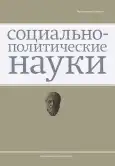Искусственный интеллект и «умный город»: от цифровизации к городу-инновации
- Авторы: Расходчиков А.Н1
-
Учреждения:
- Фонд «Московский центр урбанистики «Город»
- Выпуск: Том 12, № 4 (2022)
- Страницы: 47-54
- Раздел: Статьи
- URL: https://bakhtiniada.ru/2223-0092/article/view/146986
- DOI: https://doi.org/10.33693/2223-0092-2022-12-4-47-54
- ID: 146986
Цитировать
Аннотация
В статье рассматриваются современные теоретические подходы к формированию «умного города», оцениваются риски технологического подхода к внедрению цифровых сервисов и перспективы социально ориентированных моделей инновационного развития городов. На основе данных социологических исследований демонстрируются проблемы разбалансированности городской среды мегаполисов, анализируются возможности использования больших данных и технологий искусственного интеллекта для гармонизации среды жизнедеятельности в городах в интересах жителей.
Полный текст
Открыть статью на сайте журналаОб авторах
А. Н Расходчиков
Фонд «Московский центр урбанистики «Город»
Email: silaslowa@mail.ru
кандидат социологических наук; председатель правления Москва, Российская Федерация
Список литературы
- Colding J., Barthel S. An urban ecology critique on the “Smart City” model // J. Clean Prod 164 (Supplement C). 2017. Pp. 95-101. doi: 10.1016/j.jclepro.2017.06.191.
- Crowley M., Nutter M., Wheeler C.et al. Smart cities for sustainability: A sector-by-sector tech review. Washington DC: U.S. Urban Solutions, 2016.
- Glasmeier A., Christopherson S. Thinking about smart cities // Cambridge Journal of Regions, Economy and Society. 2015. No. 8 (1). Pp. 3-12. doi: 10.1093/cjres/rsu034, 2015.
- Kharlamov A.A., Raskhodchikov A.N., Pilgun M. Smart city data sensing during COVID-19: Public reaction to accelerating digital transformation // Sensors. 2021. No. 21 (12). P. 3965. URL: https://doi.org/10.3390/s21123965 https://www.mdpi.com/1424-8220/21/12/3965
- Komninos N. The age of intelligent cities: Environments and innovation-for-all strategies. London. New York: Routledge, 2015. 278 p.
- Trencher G., Karvonen A. Innovating for an aging society: Insights from Japanese smart cities. In: Inside smart cities: Place, politics and urban innovation / A. Karvonen, F. Cugurullo, F. Caprotti (eds.). London: Routledge, 2018. Pp. 258-627.
- De Waal M., Dignum M. The citizen in the smart city. How the smart city could transform citizenship // IT - Information Technology. 2017. Vol. 59. doi: 10.1515/itit-2017-0012.
- Алексеев В.Н. Эволюция понятия «инвестиционный климат» в переходной экономике России // Проблемы экономики и юридической практики. 2022. Т. 18. № 1. С. 173-179.
- Борисов В.В., Луферов В.С. Метод многомерного анализа и прогнозирования состояния сложных систем и процессов на основе нечетких когнитивных темпоральных моделей // Системы управления, связи и безопасности. 2020. № 2. С. 1-23. doi: 10.24411/2410-9916-2020-10201.
- Бочков С. Гуманитарная война - это всерьез и надолго // Сети 4.0: управление сложностью. М.: ВЦИОМ, АСИС, 2020. С. 30-38.
- Расходчиков А.Н. Информационно-коммуникационное взаимодействие власти и общества: в поиске эффективных технологий // Мониторинг общественного мнения: Экономические и социальные перемены. 2017. № 2. С. 263-273.
- Редина М.М. Предварительные результаты оценки транспортной нагрузки на кампус РУДН и Юго-Западный лесопарк / М.М. Редина, А.П. Хаустов // Вестник Российского университета дружбы народов. Серия: Экология и безопасность жизнедеятельности. 2022. Т. 30. № 1. С. 86-91. doi: 10.22363/2313-2310-2022-30-1-86-91. - EDN LVYULF.
- Тихонов А.В. Социология управления. М.: Канон+, 2007. С. 55-57.
- Щербинин А.И., Щербинина Н.Г. и др. Конструирование города-бренда. М.: Аспект Пресс, 2018. С. 92-93.
- Management of tourist development in regions. Moscow Centre of Urban Studies “City” // World Urban Forum (WUF10) UN-Habitat. Abu Dhabi. 2020.
- Социально-умные устойчивые города. Доклад ЕЭК ООН. Издание Организации Объединенных Наций. 2020. C. 3-5. eISBN: 978-92-1-005266-5.
- Административные барьеры в строительстве глазами московский застройщиков» 2021 г. Исследование ВЦИОМ. URL: https://c-inf.ru/wp-content/uploads/2021/12/Issledo vanie-VCIOM-ob-adminbarerah_2021.pdf
- Маркетинг территорий районов, включенных в Программу реновацию жилого фонда Москвы, 2019. Исследование Агентства социальных исследований «Столица», по заказу Фонда реновации Москвы.
Дополнительные файлы








